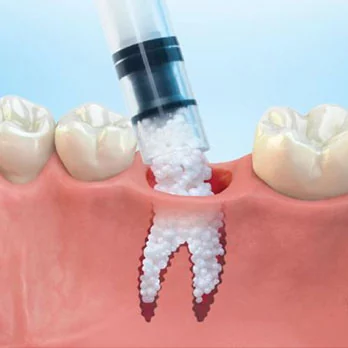
Why is bone augmentation recommended?
Bone augmentation is a common dental surgery performed all across the world. This surgery is carried out to form a strong base of dental implants. The surgical procedure is recommended, especially if you have a high chance of jawbone loss, which can cause dental and aesthetic issues.
Severe jawbone loss can make you more prone to jaw fracture. Thus, dental specialists in <city name> prefer to use a bone graft for dental implants if they suspect chances of long-term complications.
Who can perform bone augmentation?
An orthodontist or a dental specialist can perform bone augmentation procedures. It is a complex procedure that takes around one to three hours to complete. Thus only specialized dental surgeons can perform bone augmentation.
How is bone augmentation conducted?
Nowadays, different types of bone augmentation treatments are available. Your dental surgeon in <city name> will decide the best-suited procedure based on the type, number, and location of the implants required.
Four types of bone grafts can be used for bone augmentation for dental implants:
- Autograft: The graft is taken from your own body
- Allograft: The graft is taken from another person
- Xenograft: The graft is taken from animal sources such as a pig or cow
- Alloplastic graft: The artificial bone graft is made using hydroxyapatite (HA), tricalcium phosphate, and calcium carbonate
In a standard bone augmentation procedure, the dental surgeon carries out an incision in the gum to place the bone graft. Once the graft is placed correctly, the surgeon stitches back the gum. The dental implant is not placed until the jawbone heals completely, which may take about three to six months.
What are the benefits of bone augmentation?
- Offer enhanced appearance of the jaw and overall facial structure
- Enables you to speak clearly without worrying about the poor-fitting denture
- As dental implants do not slide, you can enjoy your meals comfortably
- As you feel more confident about your smile, it boosts your self-esteem
- Improves overall oral hygiene
- Highly durable and convenient
What are the possible complications of bone augmentation?
Typically, bone augmentation for dental implants is a safe surgical procedure. However, there are a few general risks associated with the treatment.
- Swelling and pain in the jaw
- Infection at the site of the surgery
- Bone graft proves to be ineffective
- Post-surgery bleeding
- Trauma or injury to the nerve which may numb the gum, cheek, or lip
Immediately reach out to your surgeon for timely medical care and attention in case any such complications arise.
Conclusion
Bone augmentation is advised when the patient’s jawbone is weak and may cause more pressure on dental implants while chewing. The treatment should not be delayed to prevent further jawbone loss and other related risks. If you have been searching for the best dental specialist in <city name>, Apollo Dental, <location name>, <city> is the right destination for you. We will assist you in booking your consultation with the best dental clinic in <city name>.
Call 1800 1020 288 to book an appointment, or click this link
Bone augmentation surgery is conducted under the effect of anaesthesia. However, as the anaesthesia wears off, it is normal to experience mild pain and discomfort for which the doctor prescribes medication.
The estimated cost of bone augmentation surgery can be anywhere between INR 20,000 to INR 40,000. However, the exact depends upon several factors like the number, location, and type of graft used.
You should avoid spitting, rinsing, or touching the wound immediately after the surgery. Furthermore, avoid consuming alcoholic and aerated beverages that may cause inflammation in the jaw.



















































